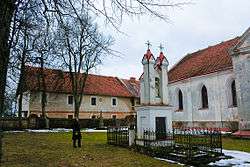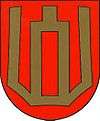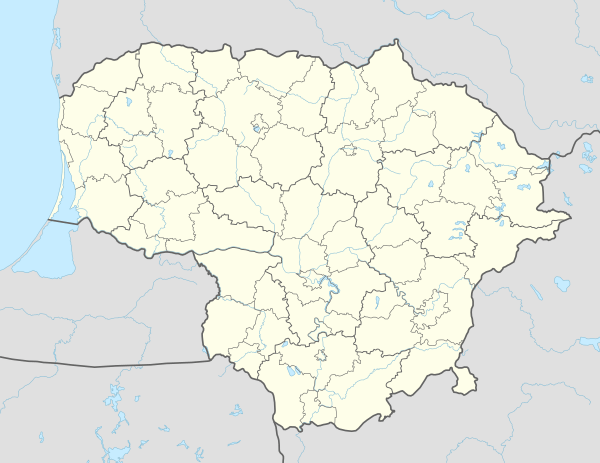Senieji Trakai
Senieji Trakai (literally: Old Trakai, Polish: Stare Troki) is a historic Lithuanian village located 3 kilometres (1.9 mi) east of Trakai. According to the Lithuanian census of 2011, it has 1,396 inhabitants – Lithuanians, Poles and Russians.[1] The Saint Petersburg–Warsaw Railway passes through Senieji Trakai.
Senieji Trakai | |
|---|---|
Village | |
 The church and cloister built on the remains of the old castle | |
 Coat of arms | |
 Senieji Trakai Location of Senieji Trakai | |
| Coordinates: 54°37′N 24°58′E | |
| Country | |
| County | Vilnius County |
| Municipality | Trakai district municipality |
| Eldership | Senieji Trakai eldership |
| Capital of | Senieji Trakai eldership |
| Population (2011) | |
| • Total | 1,396 |
| Time zone | UTC+2 (EET) |
| • Summer (DST) | UTC+3 (EEST) |
The central part of the village is proclaimed an architectural reserve. The main street is dominated by uniform wooden houses, facing it with two-windowed sides.
History
Sometime before 1321, Grand Duke Gediminas transferred the capital of Lithuania from Kernavė to Trakai (today's Senieji Trakai) and erected his brick castle. In 1337 it became a seat of the newly established Duchy of Trakai. Gediminas' son Kęstutis erected a new castle in New Trakai (today's Trakai). Kęstutis' son Vytautas was born in Old Trakai ca. 1350.
The castle in Senieji Trakai was destroyed by the Teutonic Order in 1391. The ruins of the castle were gifted to Benedictine monks by Vytautas in 1405. It is supposed that the present monastery building dating from the 15th century incorporates the remains of the Gediminas' castle.
The Trakai name, derived from Lithuanian: trakas - "the glade", suggests that the castle was built in a hollow area after deforestation.
References
| Wikimedia Commons has media related to Senieji Trakai. |
- "2011 census". Statistikos Departamentas (Lithuania). Retrieved August 17, 2017.
